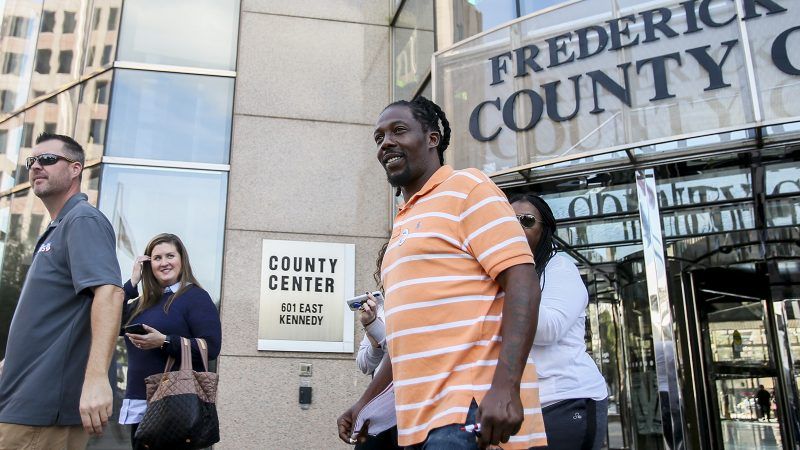Federal Judge: Florida Can't Block Felons From Regaining Voting Rights For Inability to Pay Fines
The ruling is a partial victory for civil liberties groups, who argue that lawmakers were subverting a constitutional amendment expected to restore voting rights to 1.4 million Floridians.

Florida can't bar residents with felony records from regaining their right to vote just because they're unable to pay off their court fines and fees, a federal judge ruled Friday night.
Last November, Florida voters approved Amendment 4 by 64 percent. The constitutional amendment was supposed to restore voting rights to an estimated 1.4 million Floridians with felony records, the largest single expansion of the franchise in recent history.
Complications emerged almost immediately. The language of Amendment 4 said that voting rights would be restored "upon completion of all terms of sentence including parole or probation," but it did not say whether "all terms" included financial obligations imposed by courts.
So Florida Republicans introduced and passed a bill to require payment of fines and fees as a condition of regaining one's right to vote. Legislators said they were merely clarifying the language, but civil liberties groups assailed the law, calling it a poll tax. (When the language for the ballot measure was initially approved, a lawyer for the group submitting the amendment explicitly told the Florida Supreme Court that the terms would include payment of fines and fees.)
Tonight, U.S. District Judge for the Northern District of Florida Robert Hinkle partially granted a preliminary injunction sought by the American Civil Liberties Union (ACLU), the Florida Rights Restoration Coalition, and several other advocacy groups seeking to block the law. Hinkle's ruling says Florida can make payment of court fines and fees a requirement for regaining voting rights, but not for those who are too poor to pay.
"When an eligible citizen misses an opportunity to vote, the opportunity is gone forever; the vote cannot later be cast," Hinkle wrote. "So when a state wrongly prevents an eligible citizen from voting, the harm to the citizen is irreparable. Each of these plaintiffs have a constitutional right to vote so long as the state's only reason for denying the vote is failure to pay an amount the plaintiff is genuinely unable to pay."
Florida, Hinkle ruled, must ensure that there is prompt and clear process for determining whether a former offender has the ability to pay.
"The court's decision is clear: The right to vote cannot be denied to anyone based on their inability to pay," said Micah Kubic, executive director of the ACLU of Florida. "The state must create a clear and unencumbered process that provides Florida's returning citizens the ability to vote. This is an important win for our democracy."
The Fines & Fees Justice Center has found that Florida courts, which are funded almost entirely through fines and fees, had "115 different types of fees and surcharges, the second highest number in the country." As a result, WLRN reports, Florida felony offenders will have to pay back hundreds of millions of dollars to restore their voting rights. "Across the state, over $1 billion in felony fines were issued between 2013 and 2018 alone, according to annual reports from the Florida Clerks and Comptrollers, a statewide association. Over that five year period, an average of only 19 percent of that money was paid back per year."
Prior to the passage of Amendment 4, Florida had maintained the toughest felon disenfranchisement laws in the country—a vestige of the state's 19th century "Black Codes," which attempted to systematically criminalize freed slaves following the Civil War, and then bar them from voting. It was one of four states that imposed lifetime bans on voting for people with felony records.
Friday's ruling is far from the end of litigation over Amendment 4. The Florida Supreme Court is scheduled to hear oral arguments on the issue in three weeks, and Hinkle's injunction is only temporary. It will expire when the trial in the case begins next April.
The Florida Governor's Office did not immediately respond to a request for comment, but in a statement to the Miami Herald, spokeswoman Helen Aguirre Ferré said the ruling "affirms the governor's consistent position that convicted felons should be held responsible for paying applicable restitution, fees and fines while also recognizing the need to provide an avenue for individuals unable to pay back their debts as a result of true financial hardship."


Show Comments (23)